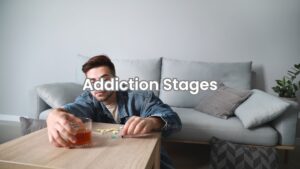Substance use disorder (SUD) is a chronic, progressive condition that impacts a person’s thoughts, emotions, and behaviors. It arises from the repeated use of substances such as alcohol, prescription medications, or illicit drugs, which over time can lead to physical dependence, emotional turmoil, and difficulty managing everyday responsibilities at work, home, or school. The impact of SUD goes beyond just habits. It rewires the brain’s reward and motivation systems, creating powerful cravings that make stopping on one’s own an immense challenge.
This is where drug and alcohol rehabilitation plays a vital role. Drug and rehab programs are designed to break the cycle of addiction by addressing both the physical and psychological roots of substance use. Through medical detox, evidence-based therapy, peer support, and relapse prevention strategies, individuals can begin the journey toward lasting recovery, restoring their health, relationships, and sense of purpose.

Understanding the Stages of Addiction
To fully grasp how drug and alcohol rehab supports recovery, it’s important to understand how addiction develops in the first place. Substance use disorder doesn’t appear overnight, it unfolds over time, often following a predictable cycle that reinforces itself without intervention.
According to the American Addiction Centers, addiction typically progresses through the following stages:
- Initial Use – This first stage involves trying a substance for the first time, often influenced by curiosity, peer pressure, stress, or experimentation. For some, this phase ends here. But for others, it marks the beginning of a longer struggle.
- Abuse – At this point, substance use becomes more frequent and starts to deviate from prescribed or social norms. A person may use it to cope with emotional pain, enhance performance, or escape reality.
- Tolerance – Over time, the body adjusts to the substance, requiring larger amounts to achieve the same effect. This increasing tolerance is a key warning sign that casual use is turning into a deeper problem.
- Dependence – In this stage, the body and brain begin to rely on the substance to function “normally.” Stopping or reducing use often leads to withdrawal symptoms, both physical and psychological.
- Addiction – At this point, substance use becomes compulsive and difficult to control. Despite knowing the harm it’s causing to health, relationships, and responsibilities, continued use feels impossible to stop without help.
- Relapse – Even after a period of abstinence, many individuals return to substance use, often due to untreated triggers, stress, or emotional struggles. This doesn’t mean failure. It simply highlights the chronic nature of addiction and the importance of ongoing support.
Understanding these stages reinforces why thorough treatment is so important. Addiction is not a result of weak willpower or moral failing, it’s a medical condition with physical, psychological, and behavioral roots. Drug and alcohol rehab programs are built to meet individuals wherever they are in this cycle and guide them toward sustainable recovery.

Types of Drug and Alcohol Rehab Programs
Addiction Treatments
Recovery from substance use takes willingness, support, and structure that is something a treatment center can provide according to the Addiction Center.
Everyone’s experience with substance use disorder is different, which is why there are multiple types of addiction treatment programs available to meet people where they are in their recovery journey. The right level of care depends on factors such as the severity of the addiction, co-occurring mental health conditions, support systems, and overall health.
Here are some of the most common types of treatment programs:
1. Inpatient Rehab (Residential Treatment)
Inpatient rehab is a structured, immersive environment where individuals live onsite for the duration of their treatment which is typically 30 to 90 days. This setting provides 24/7 medical supervision, detox services, individual and group therapy, and holistic support. Inpatient rehab is ideal for those with severe addiction, co-occurring disorders, or a history of relapse.
2. Outpatient Rehab
Outpatient programs offer many of the same therapies and services as inpatient rehab but without the residential component. Individuals live at home and attend scheduled sessions throughout the week. Outpatient care is often suitable for people with a strong support system at home and a lower risk of relapse.
- Intensive Outpatient Programs (IOP): A step up from standard outpatient care, IOPs provide more frequent sessions (often 3–5 times a week) while still allowing individuals to maintain daily responsibilities.
- Partial Hospitalization Programs (PHP): Sometimes considered a middle ground between inpatient and outpatient, PHPs offer full-day treatment without an overnight stay.
3. Detox Programs
Medical detox is often the first step in the treatment process, especially when physical dependence has developed. These programs provide medical supervision to manage withdrawal symptoms safely and comfortably. Detox alone is not a cure for addiction, but it’s a necessary first phase for many people entering rehab.
4. Dual Diagnosis Treatment
Many individuals with substance use disorder also experience co-occurring mental health conditions, such as depression, anxiety, PTSD, or bipolar disorder. Dual diagnosis programs are designed to treat both conditions simultaneously, ensuring that neither is overlooked during the recovery process.
5. Faith-Based or Holistic Rehab
In addition to traditional approaches, some treatment programs integrate spiritual, holistic, or alternative therapies, such as Christian rehab, yoga, mindfulness, nutrition counseling, or art therapy. These approaches emphasize healing the whole person: mind, body, and spirit.
Each type of rehab plays a specific role in the broader recovery landscape. Some individuals may begin with inpatient care and later transition into outpatient or aftercare services. Others might find success through a structured outpatient program from the start. The key is finding a treatment path that fits your unique needs and supports long-term healing.
Therapies Used in Addiction Treatment
While the structure of a drug and alcohol rehab program sets the stage for recovery, the therapies within it are what truly drive change. Addiction is as psychological as it is physical, and evidence-based therapies are designed to help individuals uncover the root causes of substance use, develop healthier coping strategies, and build a life free from drugs and alcohol.
Here are some of the most widely used therapeutic approaches:
-
Cognitive Behavioral Therapy (CBT):
CBT helps individuals recognize the negative thoughts and behaviors that fuel addiction. By challenging these thought patterns, clients can develop healthier responses to stress, triggers, and emotional pain.
-
Dialectical Behavior Therapy (DBT):
A specialized form of CBT, DBT focuses on emotional regulation, distress tolerance, and building stronger interpersonal relationships. It’s especially helpful for individuals with co-occurring mood disorders or a history of trauma.
-
Motivational Interviewing (MI):
This client-centered approach helps individuals resolve ambivalence about recovery. Through guided conversations, MI empowers people to find their internal motivation to change.
-
Contingency Management:
This behavioral therapy uses positive reinforcement, like vouchers or rewards, to encourage sobriety and consistent program participation.
-
Group Therapy:
Led by a licensed therapist, group sessions offer a space for peers to share experiences, build support networks, and develop social skills in a safe environment.
-
Family Therapy:
Addiction often affects the entire family system. Family therapy works to rebuild trust, improve communication, and educate loved ones on how to support recovery without enabling harmful behaviors.
-
Holistic Therapies:
Many rehab centers offer complementary therapies like yoga, meditation, art therapy, and exercise programs. These help individuals reconnect with their bodies, reduce stress, and enhance emotional well-being.

Aftercare and Long-Term Support
Recovery doesn’t end when a treatment and therapy program does. In fact, completing a drug and alcohol rehab is just the beginning of a lifelong process of maintaining sobriety and mental wellness. Aftercare services help individuals transition from structured treatment back into everyday life, while continuing to receive the support they need to stay on track.
Here are several common forms of aftercare:
-
Ongoing Therapy
Continued individual or group therapy sessions can help people stay focused on their recovery goals, manage stress, and address any underlying issues that may arise post-treatment. This ongoing counseling can be crucial during the early months of sobriety when relapse risk is highest.
-
Support Groups
12-step programs like Alcoholics Anonymous (AA) and Narcotics Anonymous (NA), as well as alternatives like SMART Recovery, offer peer-led accountability and encouragement. Many people rely on these groups for years or even decades as part of their sobriety routine.
-
Relapse Prevention Planning
Many aftercare programs include a specialized relapse prevention plan. This helps individuals identify triggers, establish coping strategies, and build a network of people they can turn to when struggling.
-
Alumni Programs
Some treatment centers have alumni programs that host events, provide check-ins, and foster long-term connections among graduates. Staying in touch with a treatment community can help maintain a sense of belonging and purpose.
Why a Specialized Treatment Approach Matters
No two journeys through addiction and recovery are exactly alike. That’s why the most effective treatment programs are those that adapt to the unique needs of each person. Whether someone needs intensive medical detox, support with trauma, or flexible outpatient care, having access to a wide range of options increases the likelihood of long-term success.
When considering a drug and alcohol rehab program, it’s essential to ask:
- Does this program offer therapies suited to my needs?
- Is there mental health support if I have co-occurring conditions?
- Will I have access to aftercare planning and support groups?
- How will this program help me develop life skills beyond sobriety?
The best drug and alcohol programs not only help you stop using substances but also teach you how to rebuild your life, nurture healthy relationships, and rediscover purpose.

Taking the First Step with Ridgeline
Choosing to seek help is a courageous and life-changing decision. Whether you or someone you love is struggling with alcohol, opioids, stimulants, or other substances, know that recovery is possible and it starts with a single step. With the right blend of medical support, therapy, and aftercare, drug and alcohol rehab can help you move from merely surviving to truly thriving.
At Ridgeline Recovery, we understand that addiction affects every area of a person’s life, physically, mentally, emotionally, and spiritually. That’s why our drug and alcohol rehab programs are built around evidence-based therapies, individualized care, and a compassionate team that meets you where you are. Whether you need inpatient support, outpatient flexibility, or aftercare guidance, Ridgeline offers the structure and encouragement to help you reclaim your life.
If you’re ready to explore your options, don’t wait. Reach out to a licensed treatment provider today and take the first step toward healing.
👉 Visit Ridgeline Recovery or Contact Us to take that first step together.
Recovery is not a one-time event—it’s a lifelong journey. And you don’t have to walk it alone.







